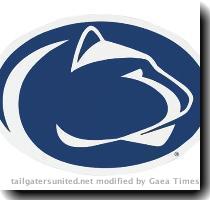Utah accepts invitation, jumps to Pac-10 from Mountain West Conference
By Doug Alden, APThursday, June 17, 2010
Utah accepts invitation to join Pac-10
SALT LAKE CITY — Utah’s road to the BCS just became a lot less complicated.
As the newest member of the Pac-10, the Utes will be playing for a guaranteed spot in one of college football’s elite bowl games rather than hoping to sneak in with an at-large berth — as they’ve done twice before.
Utah officially joined the Pac-10 on Thursday, leaving the Mountain West Conference for the prestige and more lucrative opportunities of a league where things such as the Heisman Trophy, Final Four and national titles are distinct possibilities instead of long shots.
“Today is an absolutely great day to be a Ute,” athletic director Chris Hill said Thursday before he was interrupted by applause during a news conference.
The Pac-10 invited Utah to join the league on Wednesday and university President Michael Young officially signed on in front of a crowd of elated boosters a day later.
After playing one final season in the Mountain West this fall, Utah will join the Pac-10 — or whatever the expanded league’s name will become — in 2011. There is a guaranteed BCS spot for the Pac-10 winner, but that will mean getting through a schedule of one of college football’s most prominent conferences.
“We don’t have limits right now so we can take a full swing,” Hill said after the news conference. “That’s what’s great about this opportunity for us. We can go for it.”
The announcement was held at Rice-Eccles Stadium, where the Utes have enjoyed two undefeated seasons in the past six years. The Utes received invitations to the Bowl Championship Series in 2004 and 2008, but both were at-large bids.
“I don’t really know if you can compare the two, but there’s a lot of the same feelings and a lot of the same excitement going on right now,” football coach Kyle Whittingham said.
Young noted that the Utes are 7-3 against the Pac-10 in the last 10 meetings, including wins over Arizona in 2004 and Oregon State four years later during the Utes’ two unbeaten runs to the BCS.
The leap takes the Utes from the Mountain West, where national television appearances are rare, to the major markets of the Pac-10. Hill pointed out that representatives from the Rose Bowl were on hand for Thursday’s announcement and they, too, received a boisterous greeting.
Utah played in the Poinsettia Bowl last year in San Diego, not so far geographically from Pasadena but a monumental distance in the world of college football.
“First and foremost, the reason this has happened is because the athletes that we’ve had at the University of Utah have worked so hard and done so much to put this program on the map,” Whittingham said. “That really is where the lion’s share of the credit goes to.”
The Utes were the only unbeaten team in 2008, and they didn’t get a chance to play in the BCS title game. A rout of Alabama in the Sugar Bowl bolstered Utah’s claims of being worthy. The Utes ended up finishing No. 2 in the final AP poll — the school’s highest finish.
Hill said Utah’s departure does not necessarily end the state’s biggest rivalry with BYU. Hill said he hoped to work with BYU athletic director Tom Holmoe on keeping the rivalry intact with non-conference games.
The Utes also have strong programs in men’s and women’s basketball, and women’s gymnastics that could immediately compete in the Pac-10. In sports such as baseball and tennis, the Utes will be making a tremendous leap in competition.
“It’s awesome news. It’s an unbelievable feeling in the city and around the university on a lot of levels,” men’s basketball coach Jim Boylen said. “It’s just a bigger stage for our athletes and a bigger platform to recruit from and that’s a big deal.”
The Pac-10 was courting a good chunk of the Big 12 but was turned down when Texas decided to stay put. Oklahoma, Oklahoma State, Texas Tech, and Texas A&M also decided to stay in the Big 12, which will be down one school when Colorado joins the Pac-10 in either 2011 or 2012.
Pac-10 commissioner Larry Scott said Thursday that there are a number of logistics to work through, including whether the expanded Pac-10 will form divisions in football and play a conference championship game. There is also the matter of the name, which will no-longer be accurate.
Then again, the Big 12 is looking like a 10-team league at the moment and the Big Ten has been playing with 11 teams since Penn State joined the conference in the early 1990s.
“There’s a few conferences out there that have some math problems right now,” Scott said with a chuckle.
Tags: College Football, College Sports, Men's Basketball, North America, Oklahoma, Penn state, Salt Lake City, Sports, Texas, United States, Utah, Women's Basketball, Women's Sports

